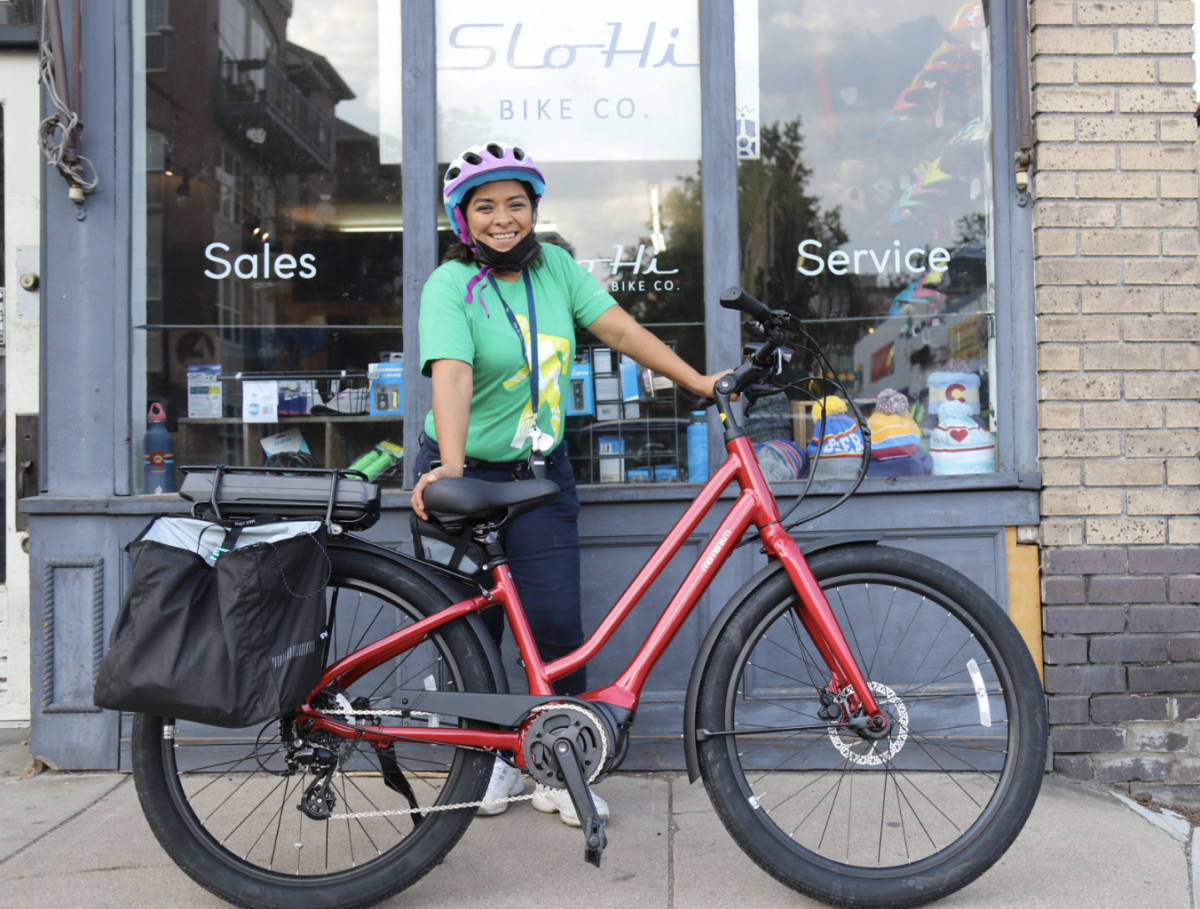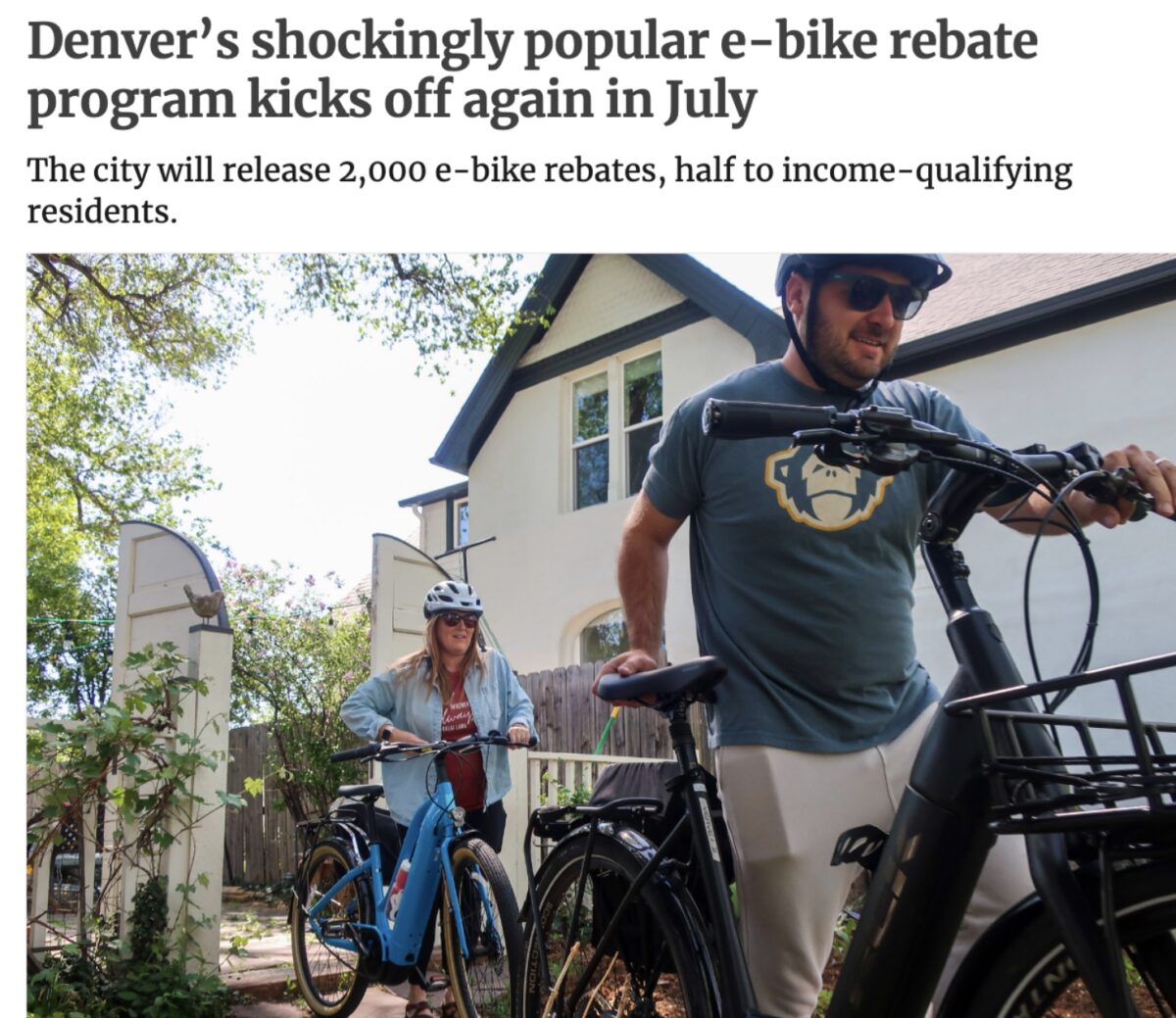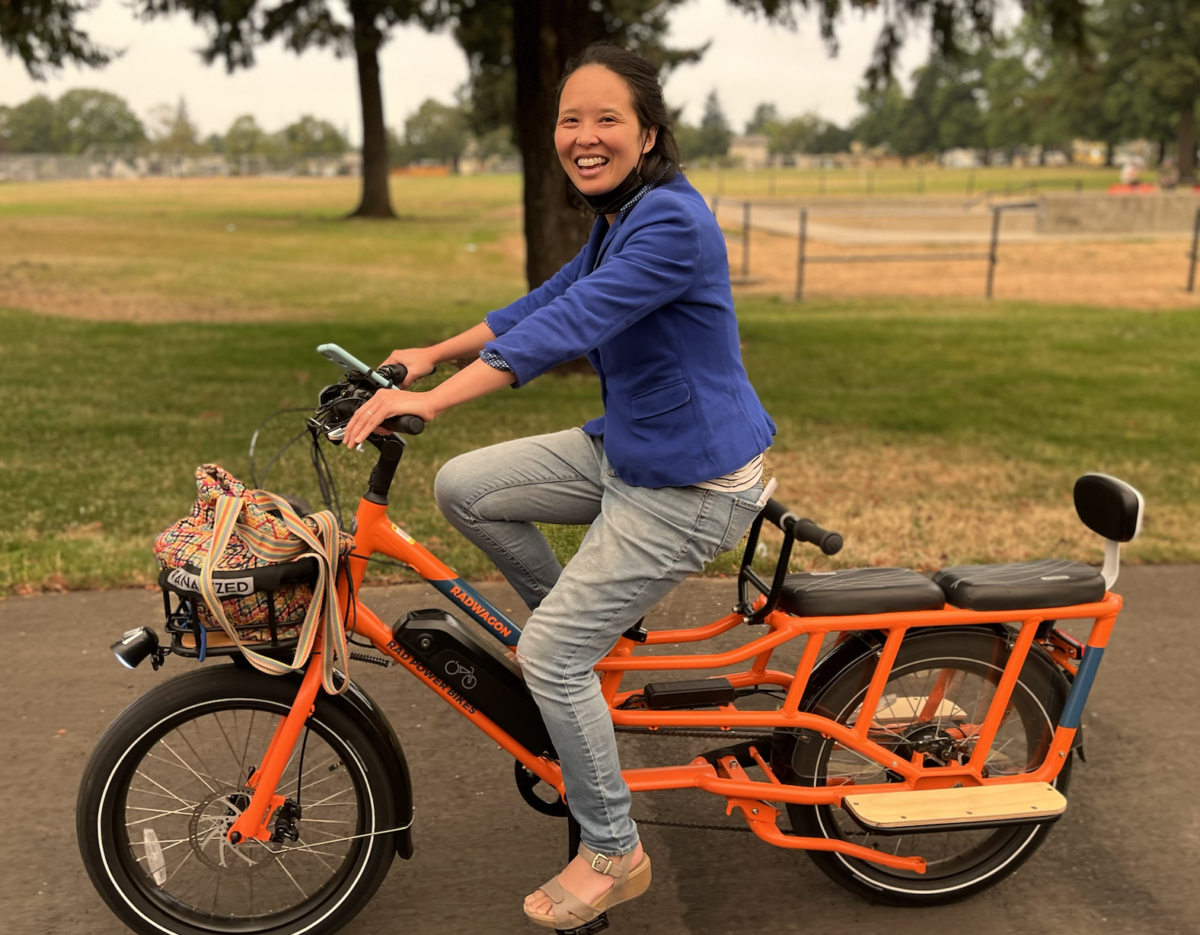The state of Colorado is pedaling circles around other states and local governments when it comes to getting its residents on electric bikes. And Oregon advocates are envious.
Rachel Hultin, sustainable transportation director at nonprofit Bicycle Colorado, shared an update on their efforts at Portland’s Electric Bikes for All working group meeting last week. From what Hultin shared, it’s evident Coloradans have realized electric bikes can be a serious tool to replace car trips.
Here’s what they’re up to…
City of Denver
The City of Denver has an e-bike rebate program funded through the city’s voter-approved Climate Protection Fund sales tax. All Denver residents are eligible for a $400 e-bike credit, and income-qualified residents can receive $1,200. Plus, there’s an additional $500 available for people buying more expensive e-cargo bikes, which many families can testify is a great substitute for the gas-guzzling minivan as a way to schlep their kids around.
In order to qualify for Denver’s e-bike rebate program, which offers 2,000 vouchers a month on a first-come, first-serve basis (they were snatched up in nine minutes this month!), you have to buy your bike from a shop with a brick-and-mortar retail location in Denver. As such, e-bike sales have boomed, demonstrating another benefit of these programs: they’re good for the local economy.
But Denver isn’t the only place in Colorado taking e-bike action – it’s happening throughout the state, including in more rural areas. Like Oregon, Colorado is a geographically large state with many remote pockets outside the large Denver metro area, and lawmakers statewide have realized electric bikes can be feasible in these rural areas, too.
“If our transportation system works for e-bikes, it’s going to work for everybody.”
– Rachel Hultin, Bicycle Colorado
A ‘Can Do’ Attitude
Hultin shared details of the Can Do Colorado Community Challenge, a program formed to “provide resources to local communities and businesses to help safely reopen the economy after COVID-19 restrictions and work toward a healthier, more sustainable future.” Through this program, the Colorado Energy Office committed $500,000 toward an e-bike pilot in 2020, giving 13 low-income essential workers in the Denver metro area a free e-bike and all the necessary accessories (helmet, lock, lights, etc.) as long as they pledged to use their new bike as their main mode of transportation.
Participants of this pilot program were asked to use an app to track their trips and provide information about how they were using their e-bikes. Apps like the recently-relaunched Ride App serve a similar purpose to give local governments an idea about how their programs are working to encourage e-bike ridership.
A report detailing the results of the 2020 e-bike pilot illustrates how the participants’ lives changed after they got their new bikes.
“Since I got the e-bike, I’m no longer using a car… I only want to take a ride or a walk on foot. It’s changed me a lot,” one participant said. Another person said they like riding their e-bike because “it frees [their] mind up away from the world for just a moment.” The psychological benefits of riding a bike versus driving a car are not to be underestimated.
Since the pilot had only 13 participants, the insights gleaned are fairly limited, but Hultin said advocates were excited to hear what they had to say – and since the program was expanded the following year, it looks like policymakers listened, too.
State of Colorado
In 2021, the State of Colorado provided $700,000 in grant awards to communities statewide to encourage e-bike access. In addition to allowing opportunities for e-bike ownership, the grants also funded some e-bike share membership programs, which Hultin said have made a big community-level impact.
This makes sense – bike share programs spread the love. Here in Portland, the Biketown for All program has allowed people who meet income requirements to access e-bikes for free. Denver has an e-bike share system too (which, like Biketown, is also operated by Lyft), but is taking on shared electric bike access from another front with its e-bike library program.
Finally, the state is developing yet another e-bike program as part of an air quality bill, which will give $12 million to programs expanding electric bike access across the state. In addition to giving more e-bike rebates to Colorado residents, this program will include an electric bike cargo commercial delivery pilot to study the feasibility of alternative freight delivery methods.
These programs are all very exciting and have proven successful to get people on bikes. But affordability isn’t the only factor preventing people from riding bikes, electric or otherwise. Even the best e-bike rebate program will fail to deliver desired results if people don’t feel safe riding their bikes to the places they need to go. Hultin said this is something advocates in Colorado are keeping in mind.
“It’s glaringly obvious there are more people riding e-bikes for transportation,” Hultin said. “It really amplifies the need to make those investments in the infrastructure.”
Hultin described the presence of e-bikes on the streets as an “indicator species of a healthy transportation system” – a sign that policymakers are investing in the right things.
“I really believe that if our transportation system works for e-bikes, it’s going to work for everybody, because it means our roads are safe. It means people have access to affordable transportation and it also means we’re really proactively working to mitigate our climate crisis,” she said.
Hultin further emphasized the political will for e-bikes in Colorado by bringing Senator Julie Gonzales, a recipient of one of Colorado’s e-bike rebates, to speak at the E-bikes for All meeting about how important her bike is to her.
“It’s such a great way to be able to move my body and also do something that’s good for my community and the planet,” Gonzales shared.
While some Oregon policymakers, like e-cargo bike rider Representative Khanh Pham (right) and national e-bike incentive advocate Rep Earl Blumenauer, have shown a personal relationship to bikes that might elevate their political commitment to the cause, Coloradans have actually moved beyond words, have taken action, and are speeding past us on this issue.
But e-bike advocates in Oregon are well-organized and impassioned, and won’t stop their work until we’re on the same path. “An exciting thing about the Colorado program is that they have some clear funding and it seemed like having that pilot project really allowed for them to make it a bigger project in the following years,” said E Bikes For All member Kiel Johnson, whose gears are already turning on how best to copy Colorado’s ideas.
See Hultin’s slide presentation (which has links to great info and resources) here.





